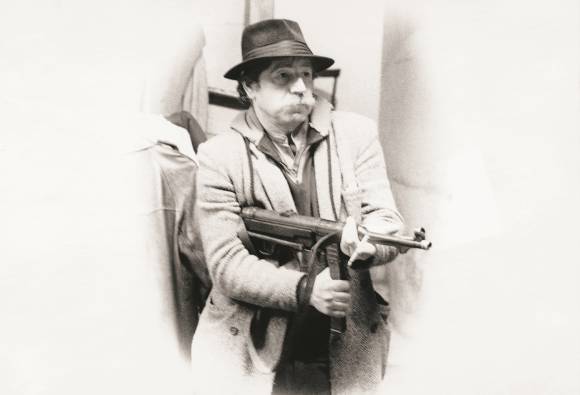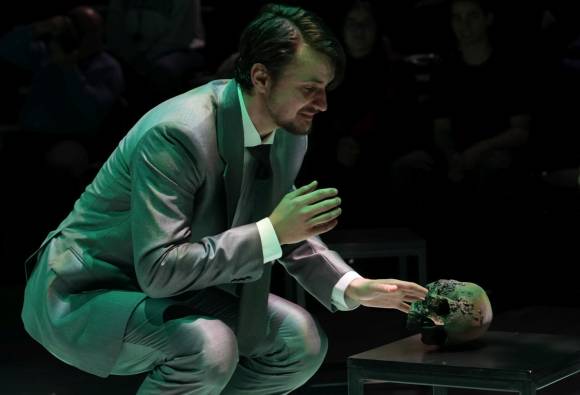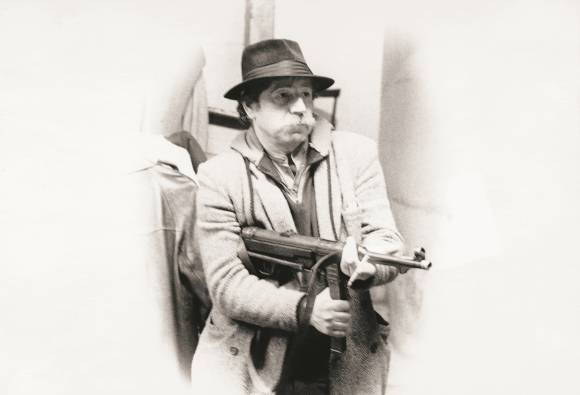
Production: Slovenski gledališki inštitut (Slovenian Theatre Institute) and Cankarjev dom
Exhibition authors: Dr Matic Kocijančič, Dr Gašper Troha and Primož Jesenko, MA
Exhibition co-authors: Tea Rogelj, MA, Ana Perne, Katarina Kocijančič, Sandra Jenko, MA
Design: Sanja Jurca Avci, Tomaž Budkovič, Dolores Gerbec
The playwright and director Dušan Jovanović occupies a prominent place in the history of the late 20th-century Slovenian and Yugoslav theatre. He was born in 1939, just before World War II, into a family with Greek, German, Croatian as well as Serbian ethnic origins. He spent his early childhood in Skopje and Belgrade and later moved to Slovenia with his father. He was an incomer, a foreigner who grew to become a theatre reformer and a daring playwright. His unending search for new ways of theatrical staging and intellectual provocations left a permanent imprint on the world of theatre. First with the Študentsko aktualno gledališče (Student Relevant Theatre), and later the Eksperimentalno gledališče Glej (Experimental Theatre Glej) and Gledališče Pupilije Ferkeverk (Pupilija Ferkeverk Theatre). His influence was most felt at the Mladinsko Theatre, where he served as Artistic Director from 1978 to 1985. Dušan Jovanović gained international renown, making his mark both in Slovenia and throughout the former Yugoslavia, as a theatre director in Serbia, Croatia, Bosnia and abroad.
As well as directing for the theatre, Jovanović made a name for himself as a prolific playwright. Oder 57, one of the first experimental theatres in post-war Slovenia, included Norci (The Madmen) in its repertoire but had been closed down before the play was staged. However, Jovanović did not admit defeat. The play was premiered seven years later at SLG Celje. He blazed new trails in avant-garde drama, for example with Znamke, nakar še Emilija (Stamps, and then Emilija), and broke with experimental theatre in Igrajte tumor v glavi in onesnaženje zraka (Play a Tumour in the Head and Air Pollution). In the late 1970s, his Osvoboditev Skopja (The Liberation of Skopje) and Karamazovi (The Karamazovs) laid the foundations for political drama, a savagely personal piece of theatre. His explorations of taboo subjects drew large crowds to theatre houses from Australia to the United States.
He is credited with reforming the Yugoslav theatre, thus earning notoriety as a cultural terrorist: the critic Josip Vidmar, who rejected these newly introduced phenomena, coined this term for a specific group of theatre practitioners (Dušan Jovanović, Ljubiša Ristić, Janez Pipan, Slobodan Šnajder, Rudi Šeligo...). As an all-round intellectual, in addition to engaging in theatre, Jovanović wrote essays on social reality, and later also poems and prose. He inspired the next generation of theatre artists as a professor at the Academy of Theatre, Radio, Film and Television – AGRFT, University of Ljubljana. Although his ambition to stage a production at Ljubljana’s Plečnik Stadium was thwarted, it testifies to his belief in the importance of striving for the impossible.
The Dušan Jovanović – Cultural Terrorist exhibition, to take place in Cankarjev dom’s Foyer I between 14 January – 7 March, addresses various aspects of Dušan Jovanović's work. It focuses on his directorial oeuvre, highlighting the phenomenon of The Liberation of Skopje, takes viewers back to the 1980s and the rise of the Mladinsko Theatre, presents Jovanović's plays and other publications, and shows – through the testimonies of his students – his influence on the younger generations. The exhibition seeks to capture Jovanović's spirit, infused with innovation, provocation and passion.
The exhibition is accompanied by the first comprehensive monograph on Dušan Jovanović, to be published by the Slovenian Theatre Institute, as well as the following side events:
29 January 2025 – Scientific symposium marking the publication of the monograph on Dušan Jovanović, with the participation of the authors of various chapters – Darja Dominkuš, Sebastijan Horvat, Hrvoje Ivanković, Aleksandra Jovičević, Milan Mađarev, Aldo Milohnić, Saša Pavček, Janez Pipan, Draga Potočnjak, Alja Predan, Tomaž Toporišič, Gašper Troha and Dragan Živadinov
8–10 February Screenings of three films dealing with Jovanović’s productions or screen adaptations of Jovanović’s plays – Vsaka dobra zgodba je ljubezenska zgodba about the 1993 staging of Boris, Milena, Radko (dir. Rajko Grlić, Matjaž Ivanišin, 2017); Delanje Leara about the 1993 production of King Lear (dir. Damjan Kozole, 1993); and Osvoboditev Skopja (dir. Danilo Šerbedžija and Rade Šerbedžija, 2016).
Produkcija: Slogi, Cankarjev dom


Bodite med prvimi ...
.... ki boste izvedeli, katere koncerte, predavanja, gledališka in plesna gostovanja in drugo pripravljamo v Cankarjevem domu,



